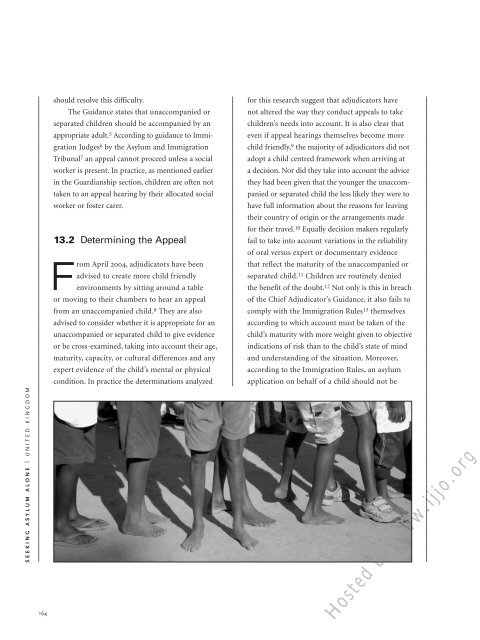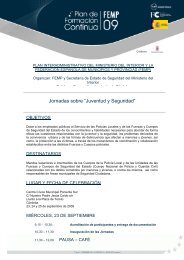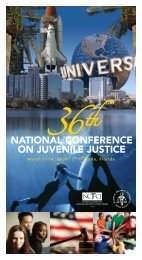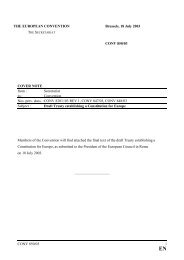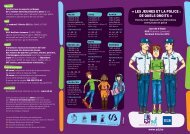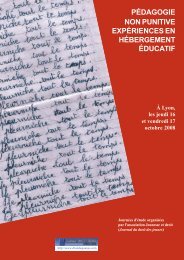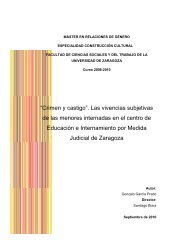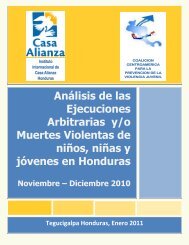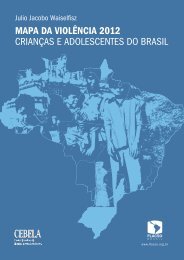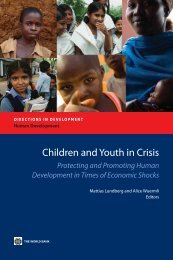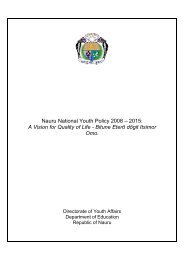Hosted by www.ijjo.org
Hosted by www.ijjo.org
Hosted by www.ijjo.org
Create successful ePaper yourself
Turn your PDF publications into a flip-book with our unique Google optimized e-Paper software.
should resolve this difficulty.<br />
The Guidance states that unaccompanied or<br />
separated children should be accompanied <strong>by</strong> an<br />
appropriate adult. 5 According to guidance to Immigration<br />
Judges 6 <strong>by</strong> the Asylum and Immigration<br />
Tribunal 7 an appeal cannot proceed unless a social<br />
worker is present. In practice, as mentioned earlier<br />
in the Guardianship section, children are often not<br />
taken to an appeal hearing <strong>by</strong> their allocated social<br />
worker or foster carer.<br />
13.2 Determining the Appeal<br />
From April 2004, adjudicators have been<br />
advised to create more child friendly<br />
environments <strong>by</strong> sitting around a table<br />
or moving to their chambers to hear an appeal<br />
from an unaccompanied child. 8 They are also<br />
advised to consider whether it is appropriate for an<br />
unaccompanied or separated child to give evidence<br />
or be cross-examined, taking into account their age,<br />
maturity, capacity, or cultural differences and any<br />
expert evidence of the child’s mental or physical<br />
condition. In practice the determinations analyzed<br />
for this research suggest that adjudicators have<br />
not altered the way they conduct appeals to take<br />
children’s needs into account. It is also clear that<br />
even if appeal hearings themselves become more<br />
child friendly, 9 the majority of adjudicators did not<br />
adopt a child centred framework when arriving at<br />
a decision. Nor did they take into account the advice<br />
they had been given that the younger the unaccompanied<br />
or separated child the less likely they were to<br />
have full information about the reasons for leaving<br />
their country of origin or the arrangements made<br />
for their travel. 10 Equally decision makers regularly<br />
fail to take into account variations in the reliability<br />
of oral versus expert or documentary evidence<br />
that reflect the maturity of the unaccompanied or<br />
separated child. 11 Children are routinely denied<br />
the benefit of the doubt. 12 Not only is this in breach<br />
of the Chief Adjudicator’s Guidance, it also fails to<br />
comply with the Immigration Rules 13 themselves<br />
according to which account must be taken of the<br />
child’s maturity with more weight given to objective<br />
indications of risk than to the child’s state of mind<br />
and understanding of the situation. Moreover,<br />
according to the Immigration Rules, an asylum<br />
application on behalf of a child should not be<br />
SEEKING ASYLUM ALONE | UNITED KINGDOM<br />
164<br />
<strong>Hosted</strong> <strong>by</strong> <strong>www</strong>.<strong>ijjo</strong>.<strong>org</strong>


